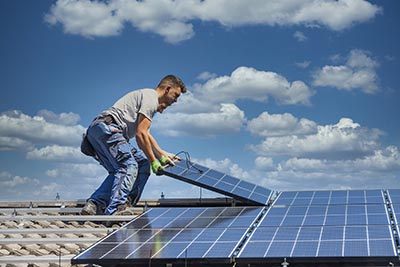
After the Virginia Clean Economy Act was passed in 2020, many Virginians embraced residential solar power in an effort to help reach the state’s goal of zero emissions by 2050. In fact, although it’s not as widely known, the 2020 SB 504 bill also played a key role in making rooftop solar more accessible to residents living in homeowners associations (HOAs): this bill essentially prevents HOAs from rejecting homeowner applications for solar panel installation. However, an existing legal loophole allows some HOAs to remain resistant to solar power, which means further positive change still needs to be made to improve solar access for all Virginians.
The problem of retroactive ‘declarations’
After the SB 504 bill was passed on July 1st 2020, many Virginia residents living in HOAs successfully chose to embrace solar panel installation. However, despite the largely pro-solar nature of the bill, a number of HOA residents remain prevented from accessing rooftop solar. This is because SB 504 still provides a pathway to restrict access to solar by allowing retroactive “declarations” on the HOA’s official land records. Fortunately, for HOAs controlled by members, retroactive declarations don’t pose a problem as it’s difficult to change existing covenants (proposed changes to a recorded covenant require approval from around 75% of all members to be successful). Above all, HOAs should enforce set policies and rules fairly by holding all homeowners to the same equal standards. Otherwise, HOA Selective Enforcement risks becoming an issue in which rules are enforced or applied consistently to all.
However, in contrast, retroactive declarations have been a problem for homeowners in developer-controlled HOAs. In developer-controlled HOAs, the developer establishes all governing documents and has sole power to change covenants at will until all or most lots are sold. And, unfortunately for homeowners, many developer-controlled HOAs have chosen to exercise their power to either stop or largely restrict rooftop solar installation. In fact, some developers have even chosen to devise new covenants that restrict solar in order to block a homeowner’s pending application to install rooftop solar panels.
That’s not to say no homeowners in member-controlled HOAs have experienced resistance to going solar. In fact, the Virginia-based Local Energy Alliance Program (LEAP) has had to aid multiple residents in this situation with the help of a legal firm. For example, a family in nearby Tidewater were forced to file a lawsuit in order to assert their legal rights to install rooftop solar. Fortunately, the family won their case, yet the victory didn’t come cheap as it racked up thousands of dollars in legal fees.
The need for positive change
Although access to solar has largely improved for HOA residents, further changes clearly still need to be made to help homeowners living in developer-controlled HOAs. By making straightforward amendments to the HOA law, all homeowners will be able to enjoy rooftop solar. In particular, giving developers the power to edit covenants is hugely problematic as it means residents may still find themselves cut-off from solar even though they initially purchased their home free from any restrictions. HOA residents that bought their homes with no solar restrictions should at least be held exempt from any future prohibitions implemented. Additionally, this move would also eliminate the potentially expensive cost and litigation risk for HOA homeowners who choose to assert their statutory rights to solar.
Improving solar access
Moreover, an even more effective option would be to legally remove solar installations from HOA oversight altogether (with, of course, reasonable allowances made for issues like design and maintenance). In fact, satellite dish installation is legally outside HOA oversight and although Congress has attempted to pass a similar law concerning solar panels in the past, it was ultimately unsuccessful. And, although some degree of restriction will be needed and inevitable, the existing law already covers these issues.
Other states can also be looked to for inspiration regarding implementing this type of legislation. For example, Florida, Utah, California, Texas, and Arizona have enacted “solar access rights” laws. Florida, in particular, has the Florida Solar Rights Act that prevents any “covenant, deed, declaration, or similar binding agreement” from stopping solar panel installation. Another legislative possibility would be to have the Attorney General become involved in these cases on behalf of homeowners. Although solar is far more accessible to Virginian’s than it only recently once was, many HOAs are still restricting homeowners from installing solar.
As Virginia continues to move towards its ambitious goal of reaching 100% clean power by 2050, legislation will need to be changed to better facilitate residential solar power in HOAs. By working to expand and edit the 2020 legislation, the General Assembly can finally free HOA homeowners from environmentally unfriendly anti-solar restrictions and help them enjoy the benefits of clean energy.
Story by Megan Mackenzie










